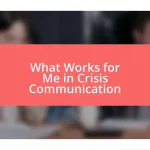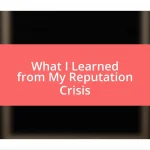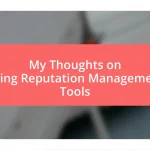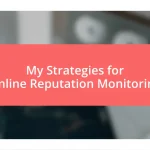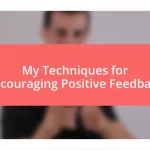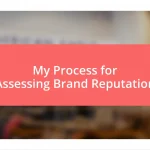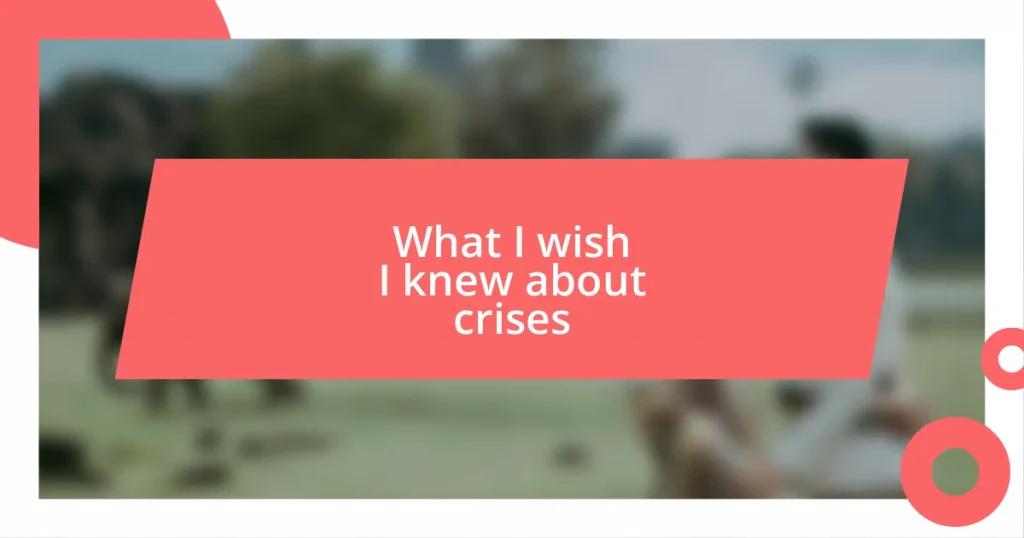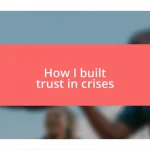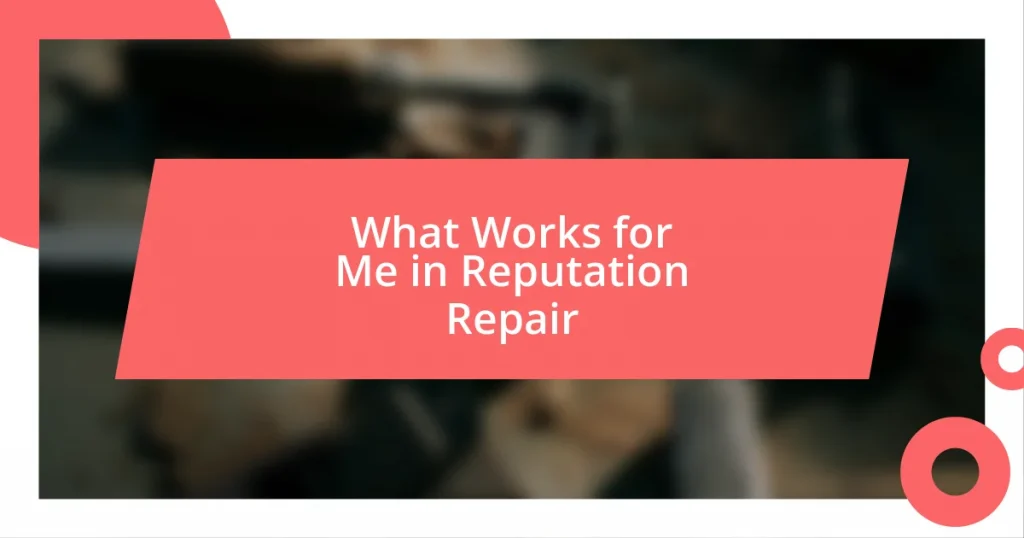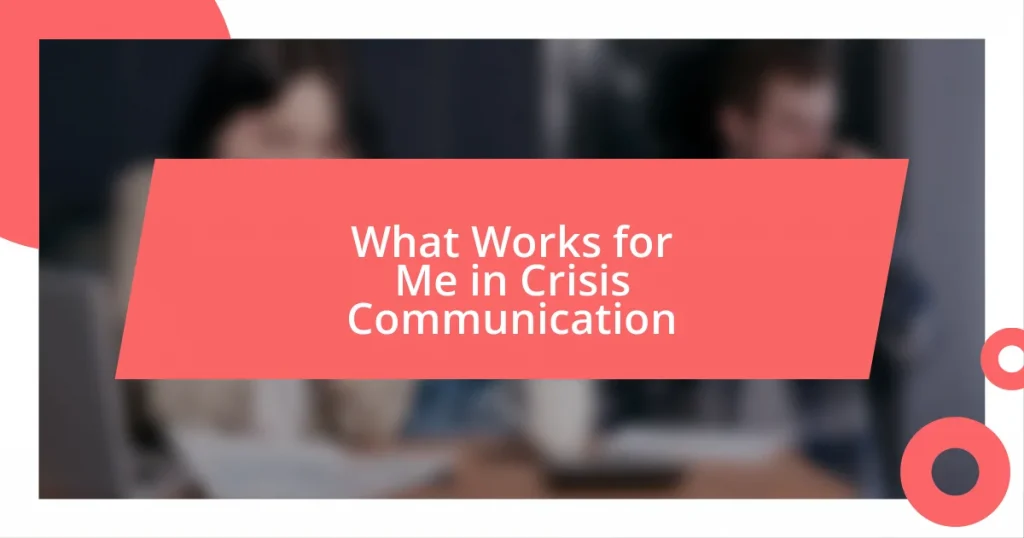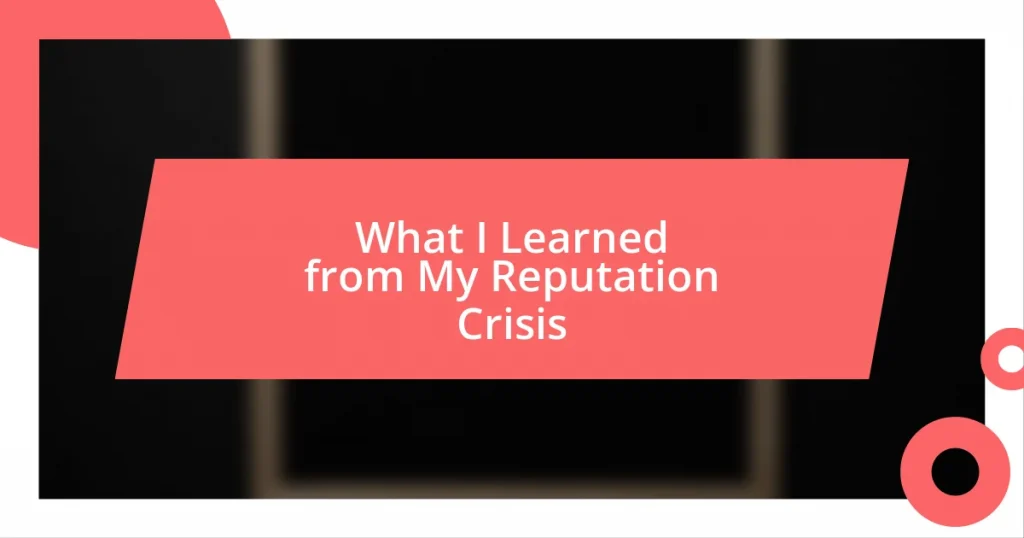Key takeaways:
- Crises can catalyze personal growth and self-discovery, revealing inner strength and prompting reevaluation of priorities and paths.
- Early intervention in crises is crucial for preventing escalation, gaining emotional support, and creating opportunities for growth.
- Seeking professional help can provide valuable perspective, coping strategies, and a safe space to explore emotions during difficult times.
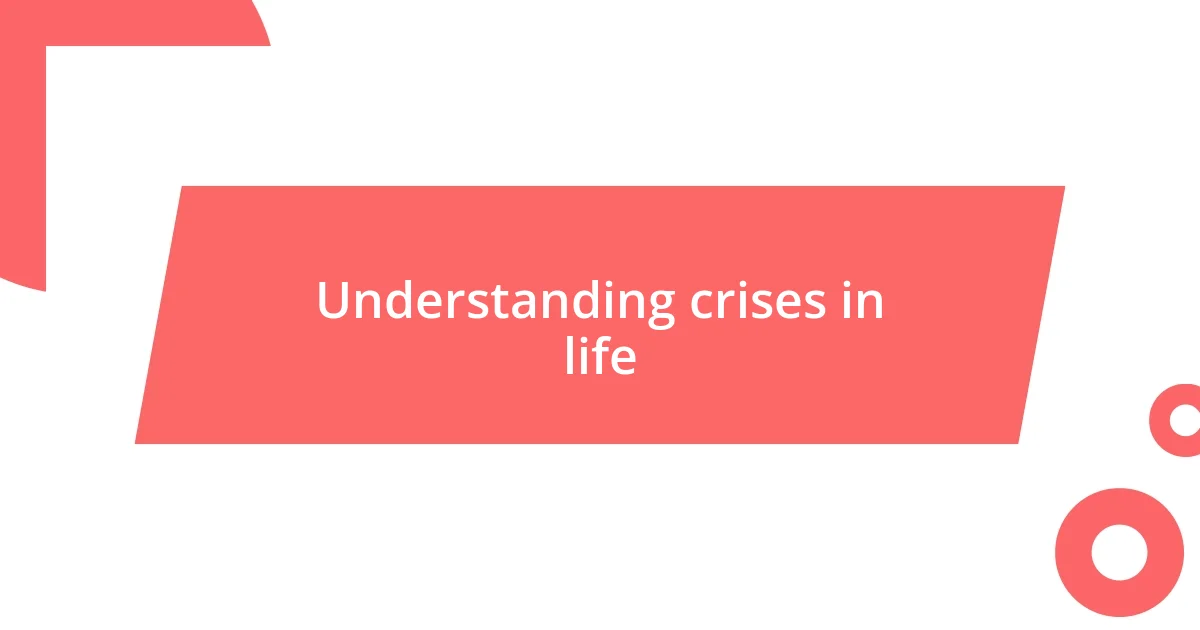
Understanding crises in life
Crises in life can feel like a sudden storm, leaving us battered and confused. I remember a time when I lost my job unexpectedly; it was a gut-wrenching blow. The truth is, these moments challenge us, forcing us to reassess our priorities and values—do we often stop to consider how crises can push us to rethink our paths?
What I’ve discovered is that crises often reveal our inner strength, even when we might not see it at first. After my job loss, I felt helpless, but as days turned into weeks, I began to unearth new skills and passion projects I hadn’t explored before. How many opportunities do we overlook because we’re comfortable?
It’s easy to view crises as solely negative, but they can act as catalysts for growth and change. Reflecting on my experiences, I’ve learned that embracing vulnerability during tough times can lead to profound transformation. Isn’t it interesting how something so challenging can ultimately guide us toward a more authentic version of ourselves?
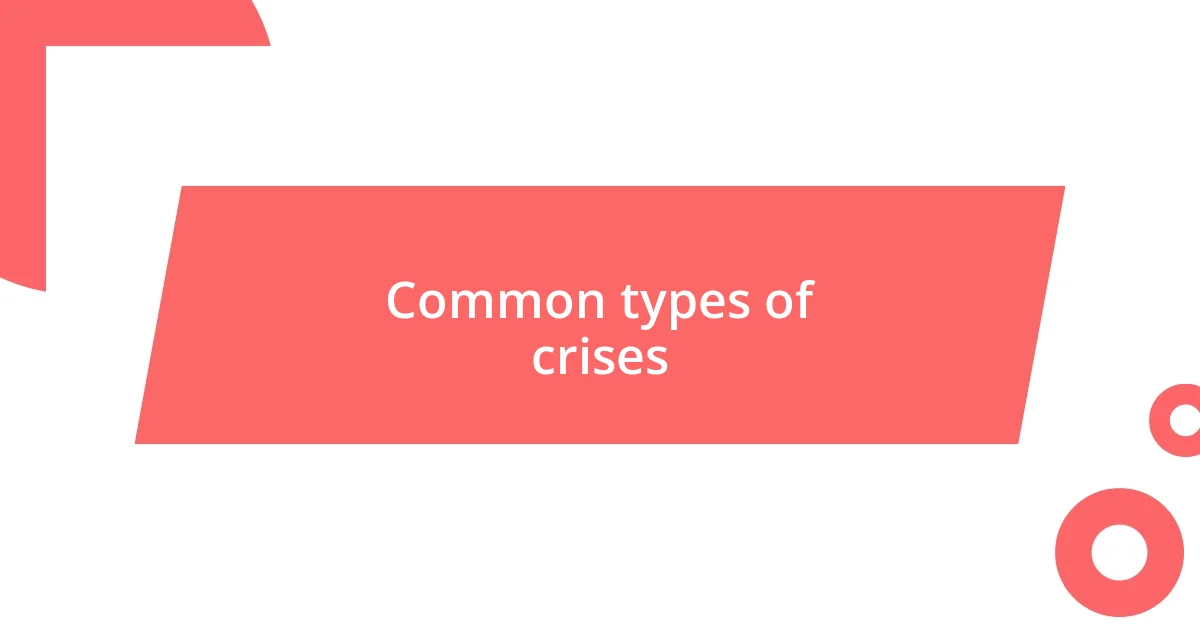
Common types of crises
Crises can take many forms, each carrying its own unique weight. For example, personal crises often stem from life transitions, like divorce or loss, evoking deep emotional upheaval. I remember feeling utterly lost during a friend’s unexpected passing; it was a painful reminder of life’s fragility.
On the other hand, professional crises can arise from layoffs or company collapses. When my workplace went through a sudden restructuring, it felt like the ground had been pulled from beneath me. I realized that these professional challenges often force individuals to reevaluate their careers and pursue paths that align more authentically with their true aspirations.
Lastly, societal crises, such as natural disasters or pandemics, impact not just individuals but entire communities. I witnessed firsthand how the pandemic disrupted lives and sparked a wave of solidarity among neighbors. It’s in these moments of upheaval that we often find unexpected strength and support, propelling us toward collective resilience.
| Type of Crisis | Description |
|---|---|
| Personal Crisis | Life transitions, such as divorce or loss, leading to emotional turmoil. |
| Professional Crisis | Job loss or company failure prompting a reevaluation of career paths. |
| Societal Crisis | Widespread issues like natural disasters or pandemics affecting communities. |
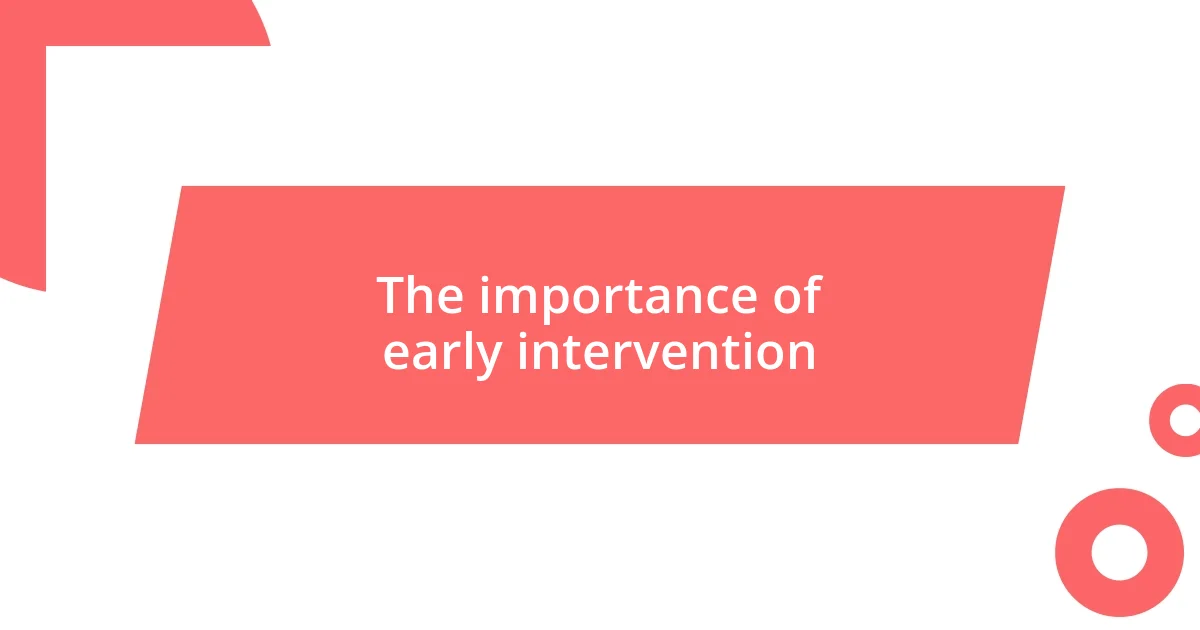
The importance of early intervention
The urgency of early intervention in crises can’t be overstated. When I faced a significant personal setback, I initially hesitated to seek help. It wasn’t until I reached out to friends and sought professional advice that I began to notice a shift in my perspective. Addressing issues early can prevent them from spiraling out of control, allowing for a more manageable recovery process.
Here’s what early intervention can achieve:
- Prevention of escalation: By addressing challenges head-on, you often stop them from becoming larger, more complex issues.
- Clarification of priorities: Early intervention helps clarify what truly matters, enabling focused action on key areas.
- Emotional support: Seeking help early can foster a network of support, providing reassurance during turbulent times.
- Reinforcement of resilience: Early action can build your coping skills, equipping you for future challenges.
- Opportunities for growth: By confronting and working through crises sooner, you open the door to learning and personal development.
Taking that first step can be daunting, but trust me, the journey is much smoother when we don’t wait until the storm has fully hit.
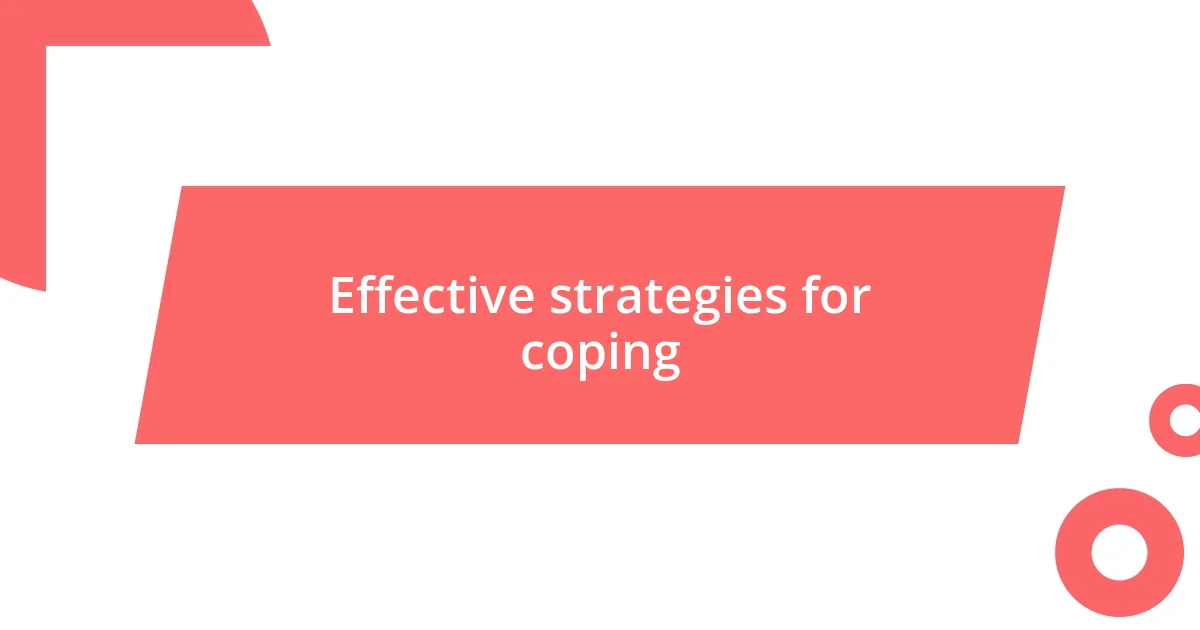
Effective strategies for coping
Finding effective strategies for coping during crises is crucial, and I’ve learned that having a solid support system can make all the difference. The moment I reached out to friends during a particularly tough time was the turning point I didn’t see coming. Their reassuring presence helped me rebuild my confidence, proving that sometimes just talking things out can alleviate the weight of our burdens.
Another strategy I often employ is deliberately carving out time for self-reflection. After a challenging experience, I like to grab a journal and let my thoughts flow onto the pages. This practice not only helps me process my emotions but also brings clarity to the chaos. Have you ever tried writing things down during a crisis? You’d be amazed at how the simple act of reflecting can turn confusion into understanding.
And let’s not forget the power of mindfulness. When everything feels overwhelming, I turn to simple breathing exercises or meditation. I once found myself in a situation where anxiety was creeping in before an important work presentation. Taking a few minutes to ground myself made a world of difference, allowing me to reclaim focus and poise. Wouldn’t you agree that a few moments of mindfulness can be a lifeline in emotional storms?
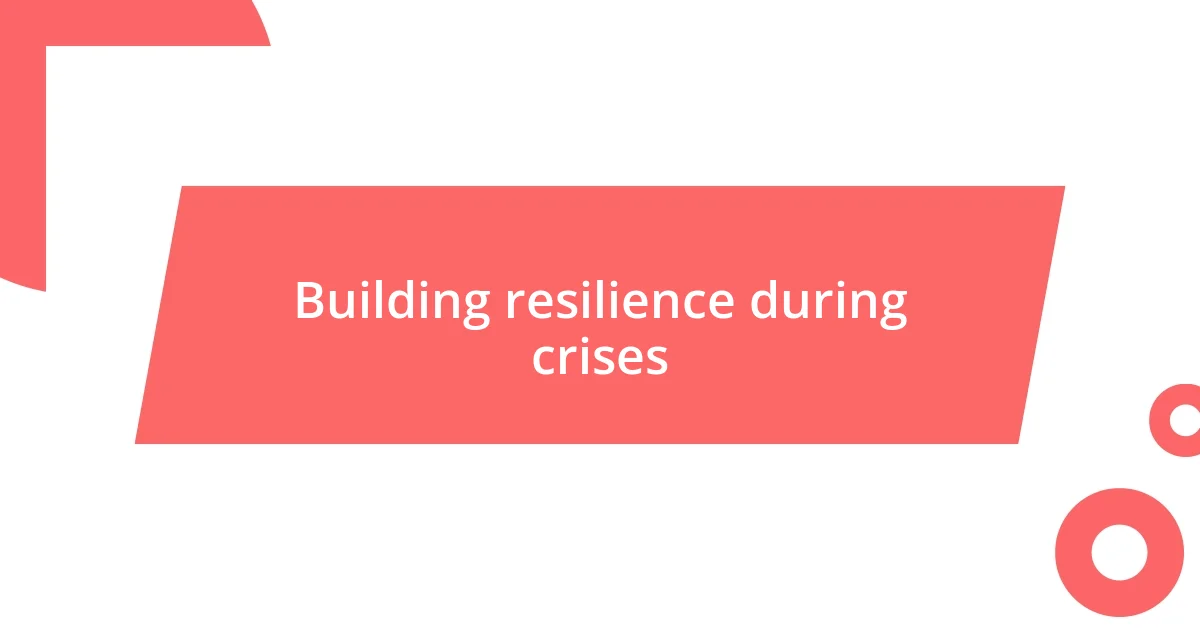
Building resilience during crises
Building resilience during crises is an ongoing journey that requires a blend of self-awareness and proactive measures. I remember a time when I was engulfed in uncertainty and negative thoughts; I didn’t know how to stand strong. It hit me that resilience isn’t about being immune to challenges but rather about how we respond to them. When I began viewing each setback as an opportunity to learn, my mindset shifted, providing me with a stronger foundation for future crises.
One of the most effective practices I’ve discovered is establishing a routine. Early on in a particularly stressful period, I made a commitment to maintain a daily schedule that included exercise, healthy eating, and time for relaxation. Believe me, having that structure not only brought a sense of normalcy but also helped me build mental and emotional strength. Have you ever considered how a simple routine could act as your ally during chaotic times?
Moreover, cultivating a mindset of gratitude can work wonders in enhancing resilience. During moments of despair, I started a gratitude journal, listing even the smallest joys. A warm cup of coffee or a friendly smile from a neighbor made their way into my entries. Focusing on these positives, even amid struggles, left me feeling more empowered. It’s a simple yet profound reminder that, even in crises, there are always glimmers of hope to hold onto.
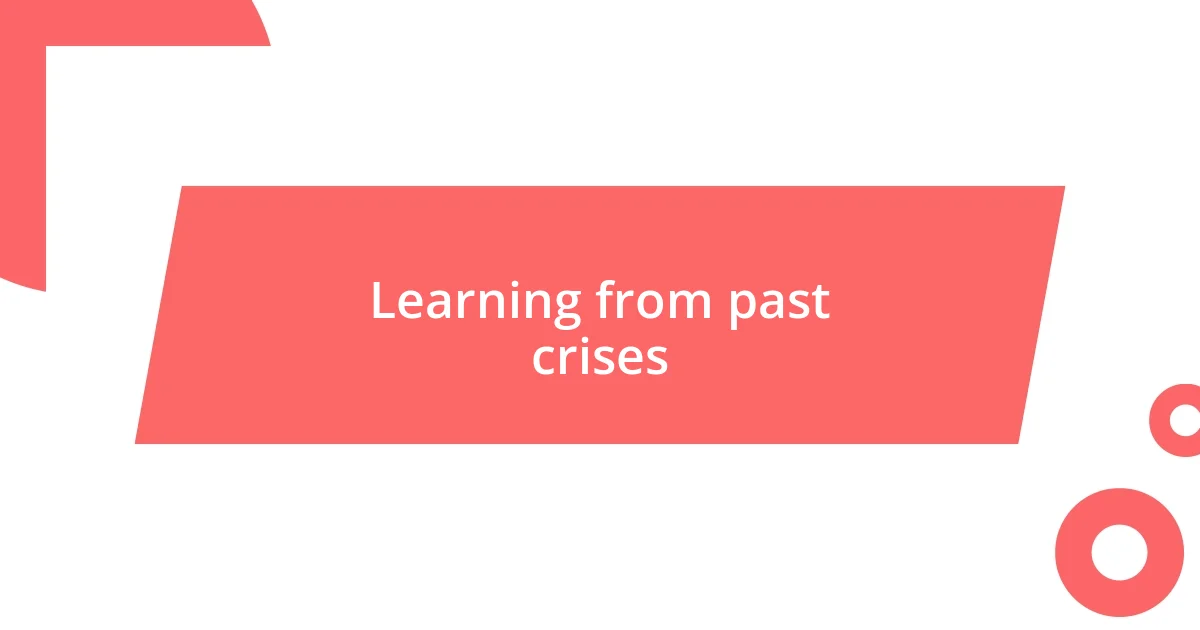
Learning from past crises
Reflecting on past crises can be incredibly enlightening. I once found myself knee-deep in a challenging situation at work, where everything seemed to unravel before my eyes. Looking back, I realized how valuable it would have been if I had studied previous challenges. Learning what strategies worked or what pitfalls to avoid could have eased my anxiety and guided me to make better decisions. Isn’t it interesting how hindsight often brings such clarity?
I recall a financial crisis I faced, which taught me not to neglect the importance of a contingency plan. I had been so focused on the present that I overlooked the potential for emergencies. After that experience, I committed to saving a small buffer fund. Do you have a backup plan for unexpected challenges? I can’t stress enough how empowering it feels to have some security in place, knowing I’ve learned from my past missteps.
Emotional lessons from crises often resonate long after the events themselves. During a personal crisis, I realized how much I undervalued self-compassion. I used to berate myself over minor setbacks, but now I understand how embracing my flaws fosters growth. Reflecting on these emotional journeys has shaped how I approach new challenges. Have you ever had a moment where you realized you were too hard on yourself? Recognizing this has made a remarkable difference in my resilience and overall well-being.
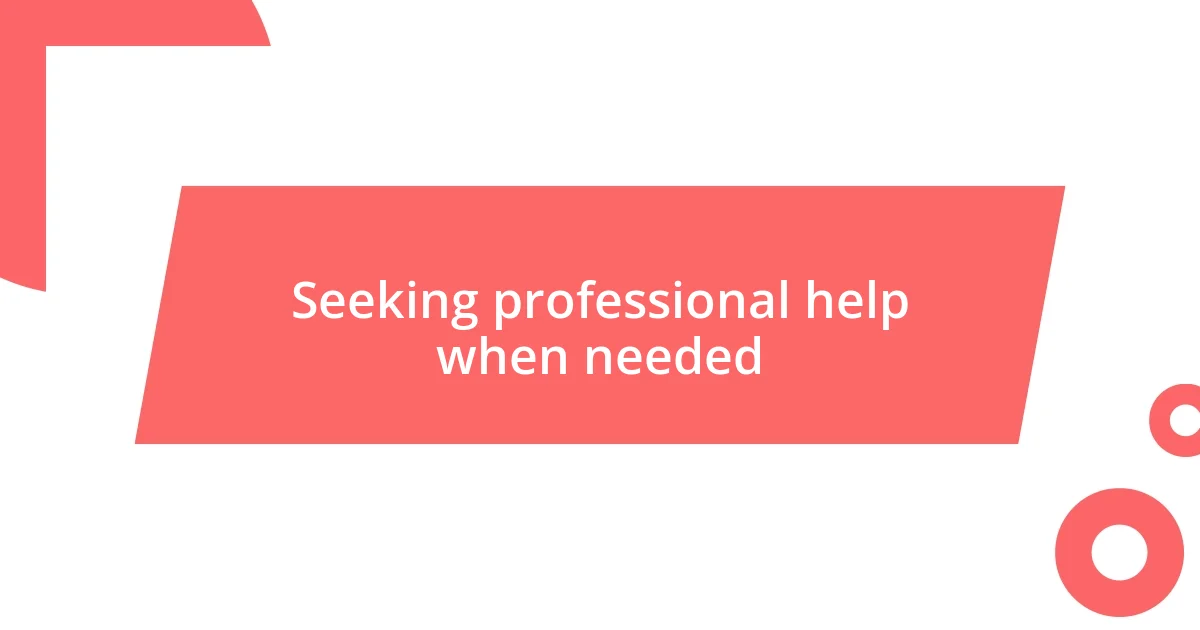
Seeking professional help when needed
Knowing when to seek professional help can be a turning point in navigating a crisis. I experienced this firsthand during a particularly dark period when my anxiety peaked. I hesitated to reach out for support, thinking I could handle it alone. But the moment I decided to consult a therapist, I found myself gaining perspective and tools I never knew I needed. Have you ever considered how much lighter a burden feels when shared with someone who understands?
It’s vital to recognize that professional help isn’t just for those in extreme distress; it’s a valuable resource for anyone feeling overwhelmed. I remember encouraging a friend who was struggling with work stress to talk to a counselor. At first, they were skeptical about its effectiveness, but after a few sessions, they shared that it opened doors to self-discovery and coping strategies. Isn’t it remarkable how guidance from a compassionate professional can shift our outlook and foster resilience?
Additionally, therapy can offer a safe space to explore emotions that may be difficult to articulate. I recall a moment in my own therapy where I unveiled feelings of inadequacy that I had buried for years. The therapist helped me navigate that complexity, showing me how those emotions were just as valid as any triumph. How often do we allow ourselves to truly feel our pain without judgment? I believe that understanding and processing those feelings can be profoundly liberating, ultimately aiding our ability to confront challenges head-on.

